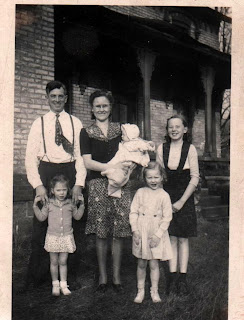Here’s the gist of questions recently raised. Why are you telling these old stories now? Why are you stuck in the past when there are so many more relevant problems and questions facing the church? One answer is that, the mission of the church was understood in various ways by leaders in the Hungarian Reformed Church back in the 1940s and 1950s. Those differences had an impact on the lives of the men and women whose stories will be told in following blog posts. I wonder how different understandings of the church's mission and the relationship of church and state affect us today. Reflecting on my own story has also helped me understand my own extended journey. Here's how it began.
At My Childhood Home
 |
| Mom & Dad & Four Sisters |
Exposure to these reports made me realize that the cornfields surrounding our house were no protection, and fearing that enemy paratroopers had silently drifted down during the night, I often fell asleep filled with quiet terror. Born at the end of World War II, I came to consciousness hearing stories of tanks capable of crushing buildings bigger and stronger than our brick farmhouse. Undoubtedly, the images of Communist atrocities merged in my mind with World War II mayhem and created a monster more fearful than wild things of children’s books.
The big bad wolf of my nightmares would not be stopped with bricks and sturdy wooden doors. Sometimes imagining bamboo slivers under my nails, I would fall asleep begging God to fix the world and protect my nails. And so I made a kind of treaty. Remembering my mother’s assurance that God would never give me more than I could bear, I promised to bear as long as my courage held up. When faced with bamboo slivers, I was quite sure, though, that I would deny him, but I would not mean it. This fear haunted my childhood. We worried about bomb shelters and radiation sickness, and wondered whether we would be able to keep family secrets if faced with diabolical Communist inquisitors.
 |
| Catherine, Marilyn, Cathy Weber & me with my brothers Jim and Sam |
Then, with the 1956 revolution, Hungary joined our family’s prayer list. My father was appalled when the United States and other western countries seemed to look the other way, having calculated that the cost of defeating the Soviet Union was more than their weakened economies and war-tired citizens could endure. And so despite its efforts to slip from under Communism, Hungary, like other Eastern Bloc countries, fell more firmly under the control of Moscow. Though stories of barbarism leaked out, it seems that we, the West, found it convenient and useful to ignore them.
The Wisdom of the Young
Oddly enough, I could hear the cries coming from Latin America and South Africa, but could not really listen to reports of torture coming from Romania and the Ukraine. Because Communist ideology promised a world of bounty for all, we could barely hear stories of Romanian refugees in our churches and communities. We wanted to believe that in search of a better omelet, only a few eggs would be broken. For many young Christians, it was appealing to embrace a system that promised equality and justice for all, and we heard the words of Jesus confirming our beliefs. By demythologizing the monster, I had defined away the source of childhood fear and recreated it as savior.
Over the years, my father’s discussion mode softened and was not as harsh as when we carried on ferocious arguments during the 1960s and 1970s. But as his death approached in 1984, he gloomily predicted a future swamped by relativism, dulled to the lowest common denominator, run by faceless, spineless bureaucrats, awash in materialism, and lacking in the moral underpinnings necessary for genuine charity. He had faith that God was in control and that Christ had won the victory over sin and death, but if I had to place him somewhere on the Already/Not yet spectrum, he would certainly have landed squarely in the Not yet camp.
Like many others, I wanted to believe that the already encompassed the political liberation underway in Europe, and if somehow they could just get it right, the system would work and God’s kingdom would come in our time.

